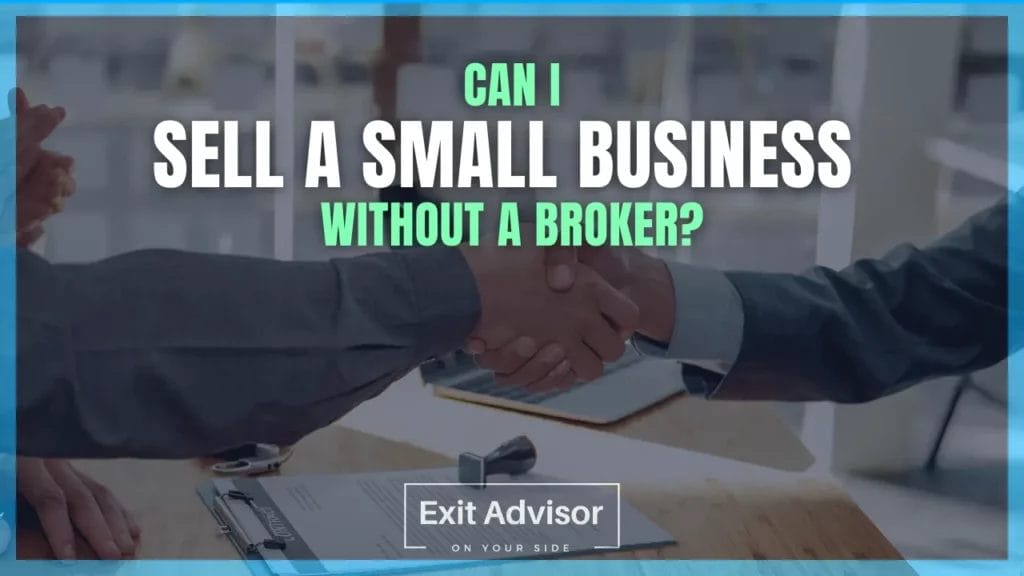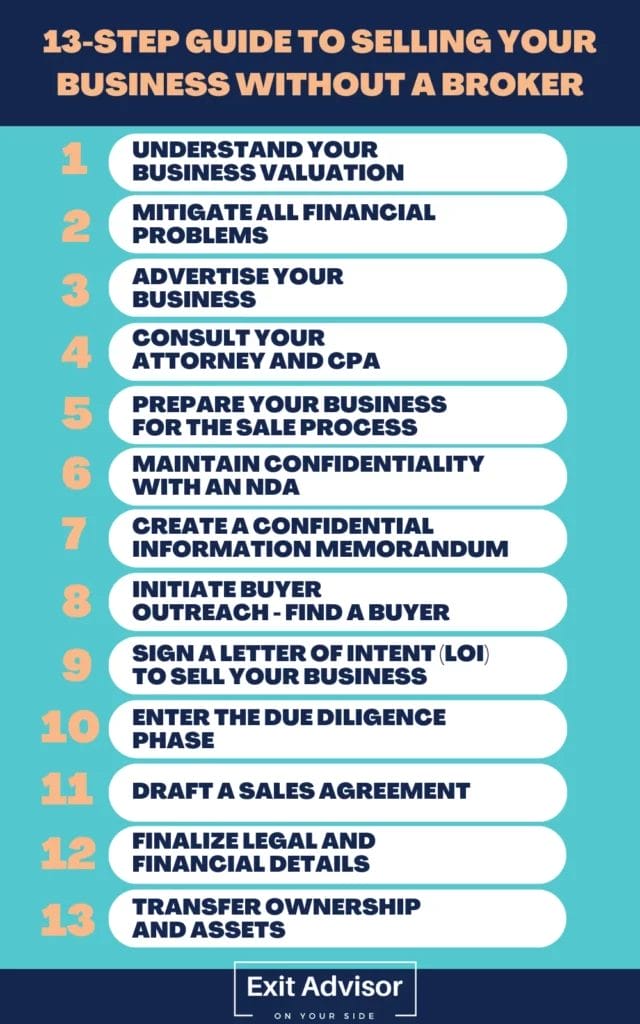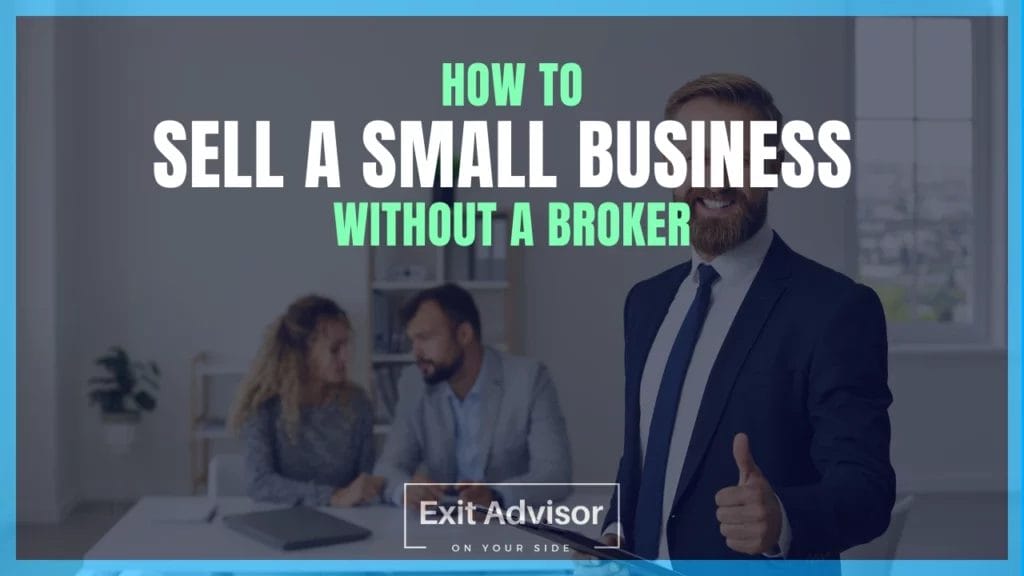Selling a small business is no small feat. It involves a plethora of decisions, evaluations, and strategies. Traditionally, many business owners turn to brokers to simplify the process. But what if I told you that you could sell your small business without the assistance of a broker? Yes, it's possible.
Selling a small business means managing marketing, negotiating, and closing the deal yourself. While it may seem daunting, many business owners opt for this path to save on broker fees and maintain control over the selling process.
This blog post aims to shed light on how to sell a small business without hiring a broker, how to find a buyer, highlighting the advantages, drawbacks, and considerations involved in this process.
Whether you're a small business owner or a large firm, if you want to sell your business with maximum profit, this guide will be useful for you. Ensure to read till the end to get a successful exit.
Can I Sell a Small Business Without a Broker?

Yes, you can sell a small business without a broker. Many business owners choose to do so to save on brokerage fees and have more control over the selling process. However, it is important to note that this approach may not suit everyone. Selling a business without using a broker may require time, effort, and knowledge of the market and legal processes. Without the help, it may require a certain level of expertise in marketing and negotiating to ensure a successful sale.
Moreover, it is essential to consider the potential drawbacks of planning to sell a small company without a business broker. Without the assistance of a professional, you may not be able to get a business valuation and negotiate for a fair price. You may also face challenges marketing your business effectively and reaching potential buyers.
That being said, there are also significant advantages to avoiding business brokerage services. As mentioned, you can save on broker fees, amounting to a considerable sum. Additionally, you have more control over the selling process and can decide based on your priorities and goals. However, remember that a broker can help make a more profitable exit than your estimate, and in the end, the broker fee can be worth paying.
When to Sell Your Small Business
Deciding when to sell a business is a crucial aspect of the selling process. Timing can greatly impact the success of your sale, and the value you receive for your business is worth it. It is important to carefully consider various factors before making this decision.
One key factor to consider is the current market conditions. Is it a buyer's or seller's market? Are there any economic or industry trends that could affect the value of your business? Conducting thorough research and analysis is essential to determine the best time to sell.
Another important consideration is your circumstances. Are you ready to let go of your business? Do you have any upcoming plans or commitments that may affect the selling process? These factors can greatly impact the timeline and success of your sale.
Additionally, it is important to evaluate the state of your business. Is it performing well and showing growth potential? Or are there any challenges or issues that could hinder a successful sale? It is crucial to have a realistic understanding of your business's current state before deciding to sell.
Ultimately, the best time to sell a small business may vary for each individual and their unique circumstances. It is important to consider all relevant factors carefully and make an informed decision aligning with your goals and priorities. So, take the time to thoroughly evaluate your options before moving forward with the selling process without a broker.
Pros and Cons of Selling Without a Broker

Pros of Selling Your Company Without a Broker
If you're interested in selling a business without a broker, it can bring many benefits. Selling a business without the help of a broker comes with several advantages that business owners should consider.
- Cost Savings: The most apparent advantage is the potential cost savings. Brokers typically charge a commission fee that ranges from 5-10% of the sale price, which can be quite significant. Selling your business yourself eliminates this cost, saving you thousands of dollars.
- Control Over the Process: Selling your business on your means you're in control. You'll make all the decisions and set your timeline without coordinating with a third party. Small business owners may want this level of control, which helps run the business in the future.
- Direct Contact with the Buyer: When you sell without a broker, you have direct contact with the buyer. This direct communication can help build a relationship between you and the buyer, potentially fostering trust and transparency in the transaction.
Cons of Selling Without a Broker
While there are clear benefits to selling a business without a broker, there are also some significant drawbacks to this method:
- Time-Consuming: Selling a business is a complex process that involves many steps, from evaluating the business and marketing it to negotiating and closing the deal. This can take significant time, especially for someone unfamiliar with the process.
- Lack of Expertise: Brokers possess the expertise that comes with experience. They know how to value a business, market it effectively, and negotiate the best price. A business owner may lack this expertise, potentially leading to a lower selling price or a more prolonged process.
- Limited Network: Brokers often have an extensive network of contacts and potential buyers, which can help speed up the selling process. Without a broker, you may struggle to find suitable buyers, prolonging the selling process.
In short, weighing all the pros and cons before deciding whether to sell your business without a broker is essential. It may seem daunting, but with careful planning and consideration, selling your business independently can be a rewarding and profitable experience.
Selling your business without a broker is a journey of empowerment. Each step is a testament to your dedication, from understanding valuation to the final transfer of assets. Embrace the challenge and reap the rewards of a broker-free success story.
By Author.
How Working With a Business Broker Adds Value
Though business brokers get some commission in the sale profit or may charge only a high fee for selling your business, they can add a lot of value to your business.
Working with a business broker can substantially add value to selling your small business, especially online. A business broker’s expertise can streamline the selling process, ensuring smoother negotiations and favorable outcomes.
They can accurately appraise your business's price, considering factors you might overlook. With their professional networks, they can expose your business to a broader pool of potential buyers, increasing the chances of a faster, more profitable sale. They can also help with marketing strategies, presenting your business in the best light to attract quality prospects.
Moreover, a business broker understands the legalities in the selling process, helping you avoid potential pitfalls. While selling a business independently may seem cost-effective, the added value and peace of mind a business broker brings often outweigh the commission fees.
Contact The Exit Advisor for a Profitable Exit
Navigating the complex waters of business sales can be challenging, but you're not alone. “The Exit Advisor,” your trusted partner, is here to guide you every step of the way.
With our wealth of industry experience, vast network of potential buyers, and unmatched negotiation skills, we ensure you get the best return on your entrepreneurial journey. We take pride in our proven track record of facilitating successful exits that meet and exceed our client's expectations. Don't leave your success to chance.
Contact “The Exit Advisor” today, and let's set the stage for your rewarding and profitable exit. Remember, your successful business sale is just a call away!
13-Step Guide to Selling Your Business Without a Broker

Selling a business can be complex and daunting, especially if you decide to go broker-free. But don't worry!
I've developed a comprehensive 13-step guide for selling your business without a broker, covering everything from assessing your readiness to negotiating the right deal.
Follow these steps to navigate your way to a successful, broker-free sale. Each step is designed to make the process smoother and more manageable. Now, let's dive into these steps.
Step 1: Understand Your Business Valuation
The first step in selling your business without a broker involves understanding the value of your business. This step is crucial as it will influence the asking price and guide your negotiations with potential buyers.
To evaluate your business's value, you can consider several factors. These include your business's financial performance, assets, liabilities, customer base, market position, brand reputation, and growth potential.
Analyzing your financial records is a good starting point. Review your income, balance sheets, and cash flow statements for the past few years. This will give insights into your business's profitability, financial health, and cash-generating capacity.
Next, assess your intangible assets, such as your brand, customer relationships, proprietary technology, and industry networks. Although these assets may not have a direct financial value, they often significantly impact a business's worth.
The market's condition and the economic forecast can also affect your business's value. If your industry is growing, and there's a high demand for businesses like yours, you could command a higher price.
Remember, a thorough valuation is a solid foundation for every business owner looking to sell successfully. It helps you set a fair price and prepares you for negotiations, enhancing your confidence and credibility in front of potential buyers interested in buying your business.
Independently selling your business is not just a transaction; it's a narrative of resilience and strategic acumen. With each step, you're not just selling a business; you're orchestrating its legacy.
By Author.
Step 2: Mitigate All Financial Problems
Before you put your business on the market, addressing and mitigating any existing financial problems is crucial. This step can significantly enhance your business's attractiveness and credibility to potential buyers. Start by conducting a thorough financial audit of your business to identify issues such as outstanding debts, tax liabilities, or cash-flow inconsistencies.
Being transparent about your finances fulfills your ethical obligations and strengthens trust among the people you do business. If there are any financial problems, resolve them before the selling process begins. Pay off any overdue debts, settle all tax obligations, and ensure your financial records are organized and up-to-date.
Also, remember to maintain your financial performance throughout the selling process. This signals potential buyers that your business is thriving and has a promising future. Avoid making drastic changes or taking on significant new investments during this period, as they may create uncertainty and risk.
By addressing these issues upfront, you can ensure a smoother selling process and improve your chances of securing a favorable deal.
Step 3: Advertise Your Business
The next step in selling your business is to advertise your business effectively. Similar to how you would market your products or services, a solid ad for your business can significantly boost its visibility and attract potential buyers.
To begin, identify your target audience. These may be investors with a similar passion for your industry or entrepreneurs searching for established businesses that match their skills. Knowing your target audience will help you craft compelling, tailored messages that resonate with them.
Use a variety of channels to spread the word about your sale. These include business sale websites, industry publications, and your professional network. Remember to leverage the power of social media platforms and email marketing to reach a broader audience.
In your advertising materials, highlight your business's strengths and unique selling points. These could be your robust financial performance, a loyal customer base, a strong brand reputation, or a strategic market position. All these points will make your business more appealing to potential buyers.
Moreover, maintain confidentiality during advertising to avoid creating unnecessary panic among your employees, suppliers, or customers. You can do this by being careful about the details you disclose and using nondisclosure agreements with potential buyers.
Remember, effective advertising is essential for the owners to consider selling their business. It increases your business's exposure and can attract quality prospects, speeding up the selling process and increasing the chances of securing a favorable deal.
Step 4: Consult Your Attorney and CPA
A critical phase in your journey to selling your business independently involves consulting your attorney and certified public accountant (CPA). These professionals play crucial roles in ensuring legal compliance and financial accuracy, safeguarding you from potential pitfalls during the transaction.
Your attorney can help review and draft necessary legal documents, including nondisclosure agreements, sales contracts, and transfer agreements. They will ensure your rights are protected and that the terms of the sale are legally sound.
On the other hand, your CPA can provide valuable insights into the financial implications of the sale. They will help analyze the tax consequences, guide you on optimizing your capital gains, and assist in presenting your financials in the most appealing way to potential buyers. Remember, your robust financial performance and tax compliance, emphasized in Steps 2 and 3, will be key attractions to potential buyers.
Just as mitigating financial problems boosts your business appeal, ensuring legal and financial accuracy further solidifies your credibility.
By involving these professionals, you can confidently navigate the complexities of the selling process, securing a favorable deal while minimizing risks. Effective collaboration with your attorney and CPA is integral to selling your business without a broker, reinforcing the foundation for a successful sale.
Step 5: Prepare Your Business for the Sale Process
Are you ready to sell? Do you know your business? Preparing it is a part of selling. Beyond attending to the financials and legalities, you must ensure your business operates smoothly without your presence, demonstrating its sustainability and scalability to potential buyers.
Start by documenting all your business processes and systems. This step aids in maintaining consistency and efficiency, proving crucial during the transition phase post-sale.
Invest time in training and supporting your management team to manage operations independently. A competent, self-sufficient team is a compelling selling point, showcasing the business's resilience and continuity.
Furthermore, consider improving your business's aesthetic appeal, as first impressions can significantly influence buying decisions. This could involve refurbishing your premises or updating your website.
Finally, prepare a comprehensive sales package for potential buyers, including key business information such as financial reports, customer demographics, and growth projections. This package should echo the strong financial performance and legal compliance emphasized in Steps 2 and 4. Every piece of information provided must be factual and verifiable.
Step 6: Maintain Confidentiality With an NDA
Preserving confidentiality is an essential step in selling your business independently. Just like you safeguarded information while advertising your business in Step 3, upholding this principle as you interact more closely with potential buyers is crucial. One effective way to ensure this is through a Non-Disclosure Agreement (NDA).
| Remember |
|---|
| Confidentiality isn't just a legal requirement; it's a strategic shield. Protect your business's integrity with a Non-Disclosure Agreement (NDA), ensuring sensitive information remains secure throughout the selling process. |
An NDA is a legally binding document that compels potential buyers to keep all disclosed information about your business private. It protects your business's sensitive data, including financial details, customer lists, trade secrets, and strategies you highlighted when preparing your business for sale in Step 5.
It's advisable to consult your attorney (as discussed in Step 4) while drafting an NDA. They will ensure it is legally sound and sufficiently covers all the critical aspects of your business. Furthermore, insist that potential buyers sign the NDA before engaging in detailed discussions or sharing your comprehensive sales package.
Maintaining confidentiality using an NDA shields your business from potential risks, preserves its integrity, and ensures a smooth, uncontested sale process. This practice underlines the due diligence required in selling your business without a broker.
Step 7: Create a Confidential Information Memorandum (CIM)
Creating a Confidential Information Memorandum (CIM) is the next pivotal step in selling your business independently. A CIM is a detailed document providing potential buyers comprehensive information about your business. Drawing from the sales package prepared in Step 5, the CIM should highlight key aspects such as your business's history, financial performance, operations, marketing strategies, and future growth projections.
Crafting a compelling CIM requires meticulous attention to detail. Each piece of information must be factual, verifiable, and presented professionally. Remember, the CIM is a sales pitch that aims to attract and convince potential buyers.
Ensure the document is reader-friendly, with clear sections and headings for easy navigation. Link key points back to the strong financial performance and legal compliance emphasized in Steps 2 and 4. Additionally, include details about your operational successes and future strategies, as prepared in Step 5.
Maintain the confidentiality safeguarded in Step 6 by only sharing the CIM with potential buyers who have signed the NDA. In short, a well-crafted CIM is a powerful tool, providing potential buyers with a comprehensive overview of your business and increasing the chances of a successful sale.
| Did You Know! |
|---|
| Crafting a compelling Confidential Information Memorandum (CIM) is like creating a business resume. It's your chance to showcase the strengths, achievements, and potential of your business to potential buyers. |
Step 8: Initiate Buyer Outreach – Find a Buyer
Initiating buyer outreach involves identifying and contacting potential buyers and presenting them with your business proposition. The key here is to target individuals or entities who understand your industry and see the value in your business.
Use your information about your customer demographics and market trends (as compiled in Step 5) to identify potential buyers. These could be competitors, suppliers, customers, or even employees who show interest in taking ownership.
Craft a strong, succinct initial contact message that is informative yet intriguing. It should convey the opportunity without disclosing sensitive information, aligning with the confidentiality maintained in Step 6.
Follow up this initial contact with your NDA (from Step 6) and, once signed, your CIM (from Step 7) to provide potential buyers with comprehensive information about your business. Be prepared to answer questions and provide additional information as required.
Effective buyer outreach targets the right audience, carefully manages information flow, and responds to buyer inquiries. It's a delicate balancing act that, when performed correctly, can lead to finding the perfect buyer for your business.
Step 9: Sign a Letter of Intent (LOI) to Sell Your Business
Signing a Letter of Intent (LOI) marks a crucial juncture in selling your business independently. A LOI is a document that outlines preliminary terms between you, the seller, and your potential buyer. While not legally binding, it does signify a serious commitment from the buyer and provides a roadmap for the final sale agreement. It typically includes terms such as the proposed purchase price, payment structure, and any conditional clauses.
Creating a LOI demands careful attention to detail to accurately reflect the mutually agreed terms. Remember to consult your attorney (as per Step 4), who will ensure the document aligns with legal norms and protects your interests.
Maintain confidentiality by only sharing the LOI with potential buyers who have signed the NDA. After the LOI is signed, it initiates a phase of exclusive negotiations and due diligence, during which the buyer will verify the information provided in the CIM (Step 7).
Signing a LOI marks a significant milestone in selling your business, bringing you closer to finalizing the deal. It's about ensuring that the terms are beneficial for both parties and that the document sets a clear path for the completion of the sale.
Step 10: Enter the Due Diligence Phase
Entering the due diligence phase signifies a significant advancement in selling your business. This phase allows the potential buyer to fully review and verify all aspects of your business, ultimately solidifying their decision to purchase. The extensive overview typically includes, but is not limited to, financials, operations, legal compliance, and customer relations.
Maintaining transparency is key during this phase. Provide your potential buyer with all requested documents and information promptly and accurately. This may include tax returns, balance sheets, vendor contracts, customer lists, or legal documents — all of which should have been prepared in your sales package.
Remember that the due diligence phase can be lengthy, often taking several weeks to months. It's crucial to stay patient, responsive, and cooperative. The goal here is to assure the potential buyer of the validity and potential of your business, backing up the claims made in your Confidential Information Memorandum (Step 7).
Finally, remember to uphold the confidentiality agreement, ensuring that sensitive data is only shared with parties who have signed the NDA.
| Remember |
|---|
| The due diligence phase is a meticulous dance of transparency and responsiveness. Providing a thorough overview and swiftly addressing inquiries builds trust and validates the promises made in earlier steps. |
Step 11: Draft a Sales Agreement
Drafting a Sales Agreement is the penultimate and perhaps one of the most critical steps in selling your business alone. This legal document reflects the final terms and conditions of the sale, encapsulating the outcome of all the preceding steps. It often includes the final purchase price, payment terms, closing conditions, representations, and warranties.
Creating a Sales Agreement requires meticulous attention to detail, as it legally binds both parties to their commitments. It is highly recommended to engage your attorney (as referenced in Step 4) to ensure that the document is thorough, accurate, and protective of your interests.
Remembering confidentiality still holds paramount importance in this step is crucial. Only share the Sales Agreement with the potential buyer who signed the NDA.
Drafting a Sales Agreement is a decisive step that officially signifies the impending sale of your business. The document should be clear, comprehensive, and precise, encapsulating the agreement and moving you closer to completing your business sale.
Step 12: Finalize Legal and Financial Details
Finalizing the legal and financial details is the final and instrumental step that involves finalizing all contractual documents, concluding the due diligence, and ensuring that all financial matters, like settling accounts, payroll, and tax obligations, are in order. It is crucial to double-check all documents for accuracy and legal compliance, as this is the last chance to identify and correct any discrepancies before the sale is closed.
Seek the assistance of your attorney and accountant (as recommended in Step 4) to verify that all legal and financial obligations have been met. Upon completing this step, the funds are transferred, and ownership of the business is officially transferred to the buyer.
Remember to uphold the confidentiality agreement (Step 6) throughout this process, sharing sensitive information only with parties that have signed the NDA. Finalizing the legal and financial details is the last hurdle in your journey of independently selling your business. It marks the end of your responsibility and the beginning of a new chapter for your business under new ownership.
| Important |
|---|
| As you finalize legal and financial details, remember that precision is paramount. Engage with your attorney and accountant to ensure every document is accurate and complies with legal norms, marking the last lap of your broker-free journey. |
Step 13: Transfer Ownership and Assets
Transferring ownership and assets is the final step in selling your business unaided. This step must be done with precision and full transparency. Begin with a detailed handover, including all tangible and intangible assets, business contracts, and all relevant documentation. This should encompass everything from physical inventory and equipment to intellectual property rights, customer lists, and supplier agreements.
It's also important to ensure that any online assets, such as websites and social media accounts, are transferred appropriately. Some of these transitions may take time, so be prepared to actively oversee this process until all assets are securely in the new owner's possession.
Remember, your objective is to provide a smooth transition that allows the new owner to continue operating the business seamlessly. All financial transactions should be complete, and all legal obligations should be fulfilled at this stage.
Once the transfer of assets is confirmed, you will have completed the sale of your business. This signifies the end of one journey and the start of another for you and your business.
Five Key Elements for a Successful Small Business Exit Strategy

- Thoughtful Planning: An effective exit strategy stems from comprehensive and early planning. It's best to start planning your exit strategy as soon as you start your business – this promotes foresight and enables you to make informed decisions that align with your ultimate exit goals.
- Business Valuation: A realistic understanding of your business's value, derived from financial performance, assets, market position, and growth potential, is critical. This will help set a fair selling price and assist potential buyers in their decision-making process.
- Business Succession: Designating a competent successor or identifying a potential buyer long before you plan to exit can ease the transition process. This approach ensures that the business operations continue smoothly even after your departure.
- Strong Financial Records: Robust, transparent, and organized financial statements make your business more attractive to potential buyers. These records provide clear insights into your business's financial health and profitability.
- Professional Assistance: Enlisting the services of experienced professionals such as lawyers, accountants, and business brokers can add value to your exit strategy. They can guide you through the complexities of the selling process, helping you avoid potential pitfalls and legal complications.
An effective small business exit strategy combines careful planning, clear business valuation, smooth business succession, robust financial records, and professional guidance. These elements, when combined, result in a successful and profitable business sale.
Frequently Asked Questions
Do I Need a Broker to Sell My Business?
While hiring a broker to sell your business is not mandatory, having a professional on your side can prove to be highly beneficial. Brokers often have a wide network of potential buyers, extensive market knowledge, and expertise in negotiating deals. They can help you accurately value your business, market it effectively, and guide you through the complexities of the sales process. However, if you're comfortable handling these aspects on your own and want to save on the broker's commission, managing the sale independently is also an option.
How to Sell a Small Business by Owner
Selling a small business by the owner involves several crucial steps. Begin by planning your exit strategy and getting a realistic business valuation. Prepare your business for sale by ensuring that all financial records are up-to-date. Market your business strategically to attract potential buyers. Once you have interested parties, maintain confidentiality by using Non-Disclosure Agreements. Negotiate terms with the buyer and finalize the Sales Agreement under the guidance of a lawyer. Lastly, finalize all legal and financial details and transfer ownership and assets to the new owner.
How Much Do Brokers Charge to Sell a Business
The commission that brokers charge to sell a business can vary widely based on the size and value of your business, the complexity of the deal, and the level of service provided. On average, you can expect to pay a commission ranging from 5% to 10% of the selling price. However, it's important to discuss and agree on the commission rate before engaging the services of a broker.
Conclusion
Selling your business independently is a significant undertaking that requires careful planning, clear valuation, robust financial records, and professional advice.
Regardless of whether you choose to navigate this journey alone or working with a broker, the key to a successful sale lies in your preparedness. Understand the value of your business, maintain organized financial records, and plan your exit strategy early.
Remember, the goal is to sell the business and ensure a smooth transition for the new owner. The process may be time-consuming and challenging, but with the right approach, you can secure a profitable sale and embark on your next entrepreneurial journey.
In a nutshell, despite the complexities, selling your own business can provide a unique sense of accomplishment and empowerment that is truly rewarding.










